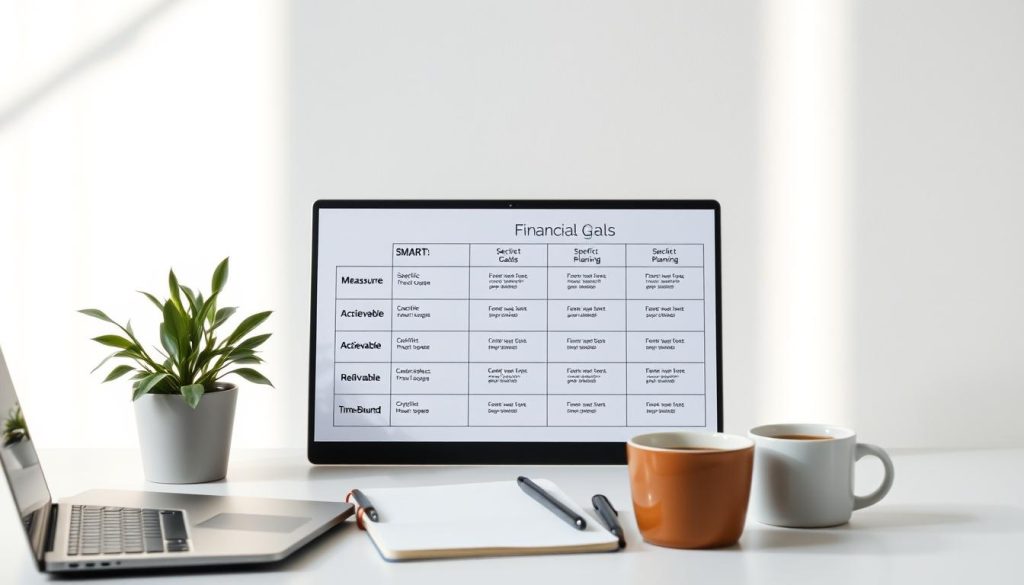Freelancing offers the freedom to work on your own terms, but it comes with unique financial challenges. Fluctuating income, managing expenses, and planning for the future are just a few of the hurdles freelancers face daily.
According to a study, 38% of freelancers struggle with irregular income, making effective financial management crucial for success.
A well-structured business plan and disciplined money management are essential for navigating these challenges. By implementing the right strategies, freelancers can achieve both professional success and personal financial security.
Table of Contents
Key Takeaways
- Understand the importance of managing your finances as a freelancer.
- Learn how to create a sustainable budget that accounts for income fluctuations.
- Discover strategies for building an emergency fund to secure your financial future.
- Explore effective tax planning and retirement savings options.
- Maximize your earning potential with the right business planning.
The Unique Financial Challenges Freelancers Face
As a freelancer, you’re not just changing your work arrangement; you’re also taking on a distinct financial landscape. Freelancing offers flexibility and autonomy, but it also presents unique financial challenges that can be daunting if not properly managed.
One of the primary concerns for freelancers is the irregularity of their income. Unlike traditional employees, freelancers don’t have a guaranteed monthly salary, making financial planning more complex.
Fluctuating Income and Its Impact
Fluctuating income can significantly impact a freelancer’s ability to budget and plan for the future. During periods of high demand, freelancers may earn more than they need, but during slow periods, they may struggle to cover essential expenses. This unpredictability requires freelancers to be highly adaptable and proactive in managing their finances.
To mitigate the effects of fluctuating income, freelancers must develop strategies for saving during prosperous times to cushion against lean periods. Effective financial planning involves not just managing income but also understanding the impact of tax obligations on their earnings.
Lack of Employer Benefits
Another significant financial challenge freelancers face is the lack of employer-provided benefits. Unlike traditional employees, freelancers are responsible for securing their own health insurance, retirement plans, and other benefits. As a sole proprietor, one can apply for health insurance through the Health Insurance Marketplace, but it’s crucial to carefully evaluate various insurance options and retirement vehicles.
Freelancers must also consider the additional financial burden of being responsible for both the employer and employee portions of certain taxes. This requires a comprehensive understanding of tax strategies and planning. As noted by financial experts, « Freelancers must be diligent in their financial planning to ensure they are prepared for the unique challenges they face. »
To navigate these challenges, freelancers must be proactive in creating a comprehensive personal benefits package, which often represents a substantial portion of their necessary expenses. By understanding these unique financial challenges, freelancers can better prepare themselves for the realities of their profession and achieve long-term financial stability.
Setting Clear Financial Goals as a Freelancer

To succeed, freelancers need to define their financial goals clearly, creating a roadmap for their business and personal finances. This involves understanding their current financial situation and envisioning their future financial state. By doing so, freelancers can make informed decisions about their income and expenses, ensuring a stable financial future.
Short-Term vs. Long-Term Financial Objectives
Freelancers must distinguish between short-term and long-term financial objectives. Short-term goals might include managing immediate expenses or saving for a specific project, while long-term goals could involve retirement planning or business expansion. Understanding the difference between these two types of goals helps freelancers prioritize their financial activities effectively.
For instance, a freelancer might set a short-term goal to save €5,000 for a new computer within the next six months, while a long-term goal could be to save €50,000 for retirement over the next 10 years.
Creating SMART Financial Goals
Creating SMART (Specific, Measurable, Achievable, Relevant, Time-bound) financial goals is crucial for freelancers. This framework ensures that their financial objectives are clear and attainable. For example, instead of having a vague goal to « save more money, » a freelancer could set a SMART goal to « save €10,000 for an emergency fund within the next 12 months. »
- Specific financial goals provide clear targets, such as saving for an emergency fund.
- Measurable goals allow freelancers to track their progress, maintaining accountability.
- Achievable objectives consider the freelancer’s current income and business growth trajectory.
- Relevant goals align with the freelancer’s broader financial strategy.
- Time-bound goals establish deadlines, creating a sense of urgency.
Separating Business and Personal Finances
Separating your business and personal finances is a fundamental step in establishing a stable financial foundation as a freelancer. This crucial distinction helps in managing your financial resources more effectively, ensuring that your business operations do not interfere with your personal financial stability.
Opening a Dedicated Business Bank Account
One of the first steps in separating your business and personal finances is to open a dedicated business bank account. This account will serve as a separate entity for your business transactions, making it easier to track your business income and expenses. When selecting a business bank account, consider factors such as fees, transaction limits, and online banking capabilities.

Some of the best business bank accounts for freelancers include those that offer low or no fees, easy online access, and robust accounting integrations. By choosing the right account, you can streamline your financial management and reduce the complexity of your business operations.
Paying Yourself a Salary
As a freelancer, it’s essential to understand that your business income is not the same as your personal income. Paying yourself a salary helps to create a clear distinction between the two. This can be achieved through an owner’s draw, where you transfer a consistent amount from your business account to your personal account on a regular schedule.
- Implementing a structured system for paying yourself creates financial discipline and helps freelancers distinguish between business revenue and personal income.
- The owner’s draw method allows freelancers to transfer a consistent amount from their business account to their personal account on a regular schedule.
- Establishing a reasonable salary based on industry standards and business performance prevents both underpayment and overpayment of the business owner.
- A consistent salary approach helps freelancers maintain personal budgeting stability despite business income fluctuations.
- As business grows, freelancers can consider more sophisticated compensation structures, potentially including tax-advantaged methods depending on their business entity type.
By adopting these strategies, freelancers can better manage their finances, ensuring a more stable and secure financial future.
Creating a Sustainable Budget with Irregular Income
For freelancers, crafting a budget that adapts to their irregular income is vital for long-term financial success. Managing finances effectively requires a deep understanding of your income patterns and expenses.
Determining Your Bare-Bones Budget
Your bare-bones budget includes essential expenses that you cannot avoid, such as rent, utilities, and critical business costs. To determine this, track your expenses over a few months to identify your necessary expenditures. Consider using a tool or service that helps in managing your finances and understanding your spending habits.
Some key components to include in your bare-bones budget are:
- Rent and utilities
- Essential business expenses
- Minimum payments on debts
- Basic living expenses
Using the 50/30/20 Budgeting Rule for Freelancers
The 50/30/20 budgeting rule is a versatile strategy that can be adapted for freelancers. Allocate 50% of your income to necessities, 30% to discretionary spending, and 20% to savings and debt reduction. This rule helps in maintaining a balance between spending and saving, even with irregular income.
For freelancers, this might mean:
- 50% for necessary expenses like rent, utilities, and critical business costs
- 30% for discretionary spending such as entertainment and lifestyle upgrades
- 20% for savings, emergency funds, and debt repayment
By following this rule, freelancers can ensure they are prepared for financial fluctuations and are working towards their long-term financial goals.
Effective Financial Planning for Freelancers
As a freelancer, navigating the unpredictability of your income requires a robust financial plan. This plan should address the unique challenges you face, including irregular income and the lack of traditional employer benefits.
Effective financial planning involves several key strategies that help you manage your finances, ensure stability, and achieve your long-term goals.
Tracking Business Expenses and Income
One of the foundational elements of financial planning for freelancers is accurately tracking business expenses and income. Utilizing expense tracking software can simplify this process. Tools like QuickBooks or FreshBooks allow you to monitor your earnings and expenditures closely, making it easier to manage your finances and make informed decisions.
![]()
Managing Cash Flow During Slow Periods
Managing cash flow is critical for freelancers, especially during slow periods. To mitigate the impact of irregular income, consider the following strategies:
- Creating a cash reserve during high-income months to serve as a financial buffer.
- Diversifying your income streams to reduce dependence on a single client or service.
- Implementing flexible payment terms and retainer agreements to stabilize your cash flow.
- Developing a specific action plan for slow periods, including intensified marketing efforts and temporary expense reduction.
By adopting these strategies, freelancers can better manage their cash flow and maintain financial stability throughout the year.
Building a Robust Emergency Fund

Building an emergency fund is a key strategy for freelancers to manage financial uncertainty. As a freelancer, you’re more vulnerable to financial shocks due to irregular income and lack of employer-provided safety nets. An emergency fund acts as a buffer, ensuring you can meet your financial obligations even during lean periods.
Determining the Right Amount
Ideally, you should save at least six months’ worth of expenses in your emergency fund. This amount can vary based on your personal circumstances, such as having dependents or living in an area with a high cost of living. To determine the right amount for you, start by calculating your monthly essential expenses, including rent, utilities, food, and minimum debt payments.
Consider the following table to understand how different expenses contribute to your overall monthly outlay:
| Expense Category | Monthly Cost |
|---|---|
| Rent/Mortgage | $1,500 |
| Utilities | $150 |
| Food | $500 |
| Minimum Debt Payments | $300 |
| Total | $2,450 |
Choosing the Right Account
Your emergency fund should be kept in a highly liquid account that allows immediate access without penalties. High-yield savings accounts and money market accounts are ideal options. They offer a balance of accessibility, safety, and modest returns that help offset inflation.
As financial expert Suze Orman once said, « An emergency fund is not just a nice-to-have, it’s a must-have for financial stability. » Maintaining your emergency fund in a separate account from your regular checking and business accounts can prevent accidental spending and create a psychological barrier to non-emergency use.
Tax Planning Strategies for Self-Employed Professionals
As a self-employed professional, navigating the complexities of tax planning is crucial for financial stability. When you’re self-employed, you may not receive the tax refund you grew accustomed to as a W2-employee. On top of that, you must pay your taxes through estimated quarterly payments instead of just filing and paying all at once.
Understanding Self-Employment Taxes in France
For freelancers operating in France, understanding self-employment taxes is essential. You can find more detailed information on tax considerations for American freelancers in on our blog.
It’s crucial to comprehend how your income from various sources is treated for tax purposes. This includes understanding what constitutes taxable income and how to report it accurately.
Quarterly Tax Payments and Deductions
Making timely quarterly payments is vital to avoid penalties and interest charges. Establishing a systematic approach to tax payments, such as setting aside a percentage of each client payment, ensures that freelancers meet their quarterly obligations.
Maximizing legitimate business expenses and deductions is also crucial for reducing overall tax liability. This includes claiming business expenses such as home office expenses, professional development, and business equipment. Maintaining meticulous documentation of all business expenses throughout the year simplifies tax preparation and strengthens deduction claims if questioned.
By working with a tax professional who specializes in self-employment, freelancers can identify additional deduction opportunities and ensure compliance with complex tax regulations, making the most of their income throughout the year.
Planning for Retirement as a Freelancer
Retirement planning is a critical aspect of financial stability for freelancers, who often face irregular income and limited access to employer-provided retirement plans. As a freelancer, it’s essential to take proactive steps to secure your financial future.
According to our survey in 2025, a significant majority of freelancers (61%) save money for their retirement through securities such as shares, ETFs, and funds, with an average monthly savings of approximately €1,098.
Retirement Account Options
Freelancers have several retirement account options to consider. These include individual retirement accounts (IRAs) and other savings vehicles that offer tax benefits. Understanding the different types of accounts available is crucial for making informed decisions about your retirement savings.
For instance, exploring options like portage salarial can provide insights into tax advantages that can be beneficial for freelancers planning for retirement.
Creating a Consistent Investment Strategy
Developing a consistent investment strategy is vital for freelancers to achieve long-term financial security. This involves adopting automated investment approaches, such as regular contributions to diversified funds, to maintain discipline despite income fluctuations.
- Dollar-cost averaging helps reduce the impact of market volatility by investing a fixed amount at regular intervals.
- Diversification across asset classes mitigates risk, which is particularly important for freelancers facing income uncertainty.
- Regular portfolio review and rebalancing ensure that the investment strategy remains aligned with the freelancer’s changing risk tolerance and time horizon.
By adopting these strategies, freelancers can work towards a more secure financial future, making the most of their time and investments.
Managing Client Relationships and Payments
As a freelancer, managing client relationships and payments effectively is vital for financial stability. Freelancers often face challenges related to late payments, which can disrupt their cash flow and create financial stress.
Setting Clear Payment Terms
Establishing clear payment terms is essential to avoid misunderstandings and ensure timely payments. This includes specifying payment due dates, accepted payment methods, and any late payment fees in your contracts or invoices.
Using invoicing software can help streamline this process by allowing you to create professional invoices and set automated reminders for clients.
Dealing with Late Payments
Late payments are a significant challenge for freelancers, with 25% of freelancers stating that they face this issue, according to a Freelancermap 2025 study. To mitigate this, consider implementing the following strategies:
- Late payments represent a significant challenge for freelancers, disrupting cash flow and creating unnecessary financial stress.
- Implementing automated payment reminders helps freelancers follow up consistently without the emotional drain of repeated manual requests.
- Including late payment fees in contracts (typically 1-2% per month) provides a financial incentive for clients to prioritize timely payment.
- Developing a systematic escalation process for severely overdue payments—from gentle reminders to formal demand letters—maintains professionalism while protecting financial interests.
- Building relationships with reliable clients who consistently pay on time should be a strategic priority, potentially warranting preferential treatment or discounted rates.
Conclusion: Taking Control of Your Financial Future
Effective financial planning is the backbone of a sustainable and rewarding freelance career. By implementing the strategies outlined in this guide, freelancers can achieve both short-term stability and long-term prosperity. Having control of your money puts your business and life in order, making you more trustworthy in the eyes of your clients.
Financial discipline doesn’t restrict freelance freedom; rather, it enhances it by providing the security to make choices based on professional growth rather than immediate financial pressure. The key is to regularly review and adjust your financial plans as your freelance business evolves, market conditions change, and personal goals shift over time.
To summarize, effective financial planning transforms freelancing from a precarious endeavor into a stable career path. It enables freelancers to build a foundation for genuine wealth and achieve a work-life balance that traditional employment often cannot provide. By following the outlined strategies, you can ensure a successful and prosperous freelance career.
As you move forward, remember that financial planning is an ongoing process. It requires consistent effort and periodic adjustments to stay on track with your goals. With the right plan in place, you can confidently navigate the challenges of freelancing and achieve long-term success.
FAQ
How can I manage my irregular income as a freelancer?
To manage irregular income, create a bare-bones budget that accounts for essential expenses, and consider using the 50/30/20 budgeting rule to allocate your income effectively.
What is the best way to separate my business and personal finances?
Open a dedicated business bank account to keep your business and personal finances separate, making it easier to track business expenses and income.
How much should I save in my emergency fund?
Aim to save 3-6 months’ worth of living expenses in your emergency fund to ensure you’re prepared for unexpected expenses or slow periods.
What are my options for retirement savings as a freelancer?
Consider opening a retirement account, such as a SEP-IRA or solo 401(k), to save for retirement and take advantage of tax benefits.
How can I effectively track my business expenses and income?
Use accounting software, such as QuickBooks or Xero, to track your business expenses and income, making it easier to stay on top of your finances.
What are some strategies for managing cash flow during slow periods?
Consider implementing a cash flow management plan, which includes maintaining an emergency fund, managing accounts receivable, and adjusting your expenses accordingly.
How can I minimize my tax liability as a self-employed professional?
Take advantage of tax deductions for business expenses, and consider making quarterly tax payments to avoid penalties and interest.
What are some best practices for managing client relationships and payments?
Establish clear payment terms, communicate regularly with clients, and consider using a payment processing system, such as Stripe or PayPal, to streamline transactions.





